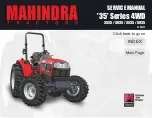
4 - OPERATING INSTRUCTIONS
Hydrostatic Transmission (HST) - Operation
The Hydrostatic Transmission (HST) provides a wide range of ground speeds given the range the operator selects
and the speed of the engine.
NOTE:
Please see chapter 3 - CONTROLS AND INSTRUMENTS starting on page
3-1
if you are not familiar with the
controls in the operating guidelines below.
The operator has the following inputs to control the HST.
• Hand throttle setting or engine speed
• HST range selection
• Forward or reverse pedal application
The HST has two transmission ranges “L” range and “H” range. The table below shows the ground speeds of the
tractor when the engine running at
3235 RPM
.
Range and direction
Speed
“L” range - Forward direction
0.0 – 6.1 km/h
(
0.0 – 3.8 mph
)
“H” range - Forward direction
0.0 – 14.6 km/h
(
0.0 – 9.1 mph
)
“L” range - Reverse direction
0.0 – 3.7 km/h
(
0.0 – 2.3 mph
)
“H” range - Reverse direction
0.0 – 8.8 km/h
(
0.0 – 5.5 mph
)
The operator can achieve these speeds by gradually depressing the forward or reverse HST pedals. The further the
forward or reverse pedals are depressed the faster the tractor will travel in that direction.
The engine has an operating range of
1500 – 3235 RPM
. Use the hand throttle and set the engine RPM in that oper-
ating range. Light work will require less engine throttle while heavy or high travel speeds will require full throttle. Pick
the engine speed that works best for the application you are performing.
The correct HST range will depend on what operation is being performed. “L” range is generally used for heavy loads
or operations needing high engine speed and slow ground speeds.
Examples of operations “L” range would be appropriate
• Rototiller operation
• Pulling heavy loads
• Precision operations in close quarters
• Heavy front end loader operation
• Mowing operation on steep hills
“H” range is generally used for light loads or operations that do not require full throttle. “H” range works well for
transport operations when high speed is required.
Examples of operations “H” range would be appropriate
• Transport operation
• General mowing operation
• Light front end loader operation
4-13
Summary of Contents for Workmaster 25S
Page 20: ...1 GENERAL INFORMATION 1 14 ...
Page 102: ...3 CONTROLS AND INSTRUMENTS 3 40 ...
Page 118: ...4 OPERATING INSTRUCTIONS 4 16 ...
Page 186: ...7 MAINTENANCE 7 50 ...
Page 199: ...9 SPECIFICATIONS NHIL17CT01125FA 1 NHIL17CT01124FA 2 9 9 ...
Page 200: ...9 SPECIFICATIONS 9 10 ...









































